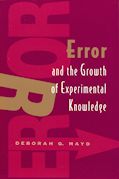In Error and the Growth of Experimental Knowledge,
Deborah G. Mayo proposes her error-statistical approach as
a robust framework for solving some of
the most persistent philosophical problems about objectivity and induction,
and about progress and rationality.
In Mayo’s view, we learn about the world by being shrewd inquisitors
of error—by actively probing, manipulating, and simulating patterns of error,
and by deliberately introducing known patterns of error
into the collection and analysis of data.
Statistical considerations are used not to provide a measure of support
for or probability of hypotheses, but to model patterns of
irregularity that are useful for distinguishing errors,
and for amplifying day-to-day strategies for capitalizing on
a knowledge of mistakes.
Mayo’s approach differs markedly from most philosophies of induction,
especially the popular Bayesian view of statistical inference,
against which she launches a vigorous critique.
Mayo’s informal and accessible discussions allow a wide-ranging audience of scholars to grasp the heart of key statistical issues too often shrouded in mathematical complexity. This book will be important far philosophers and methodologists of science as well as for researchers in the physical, biological, and social sciences.
